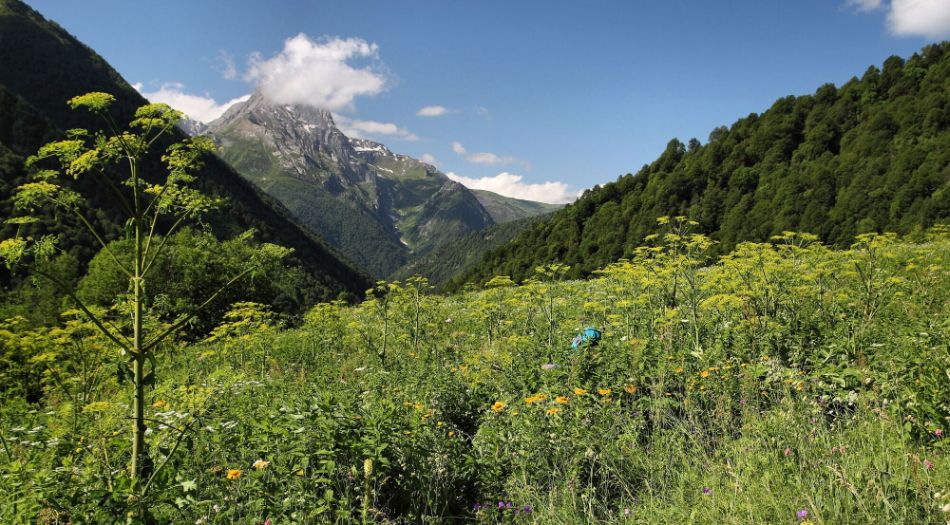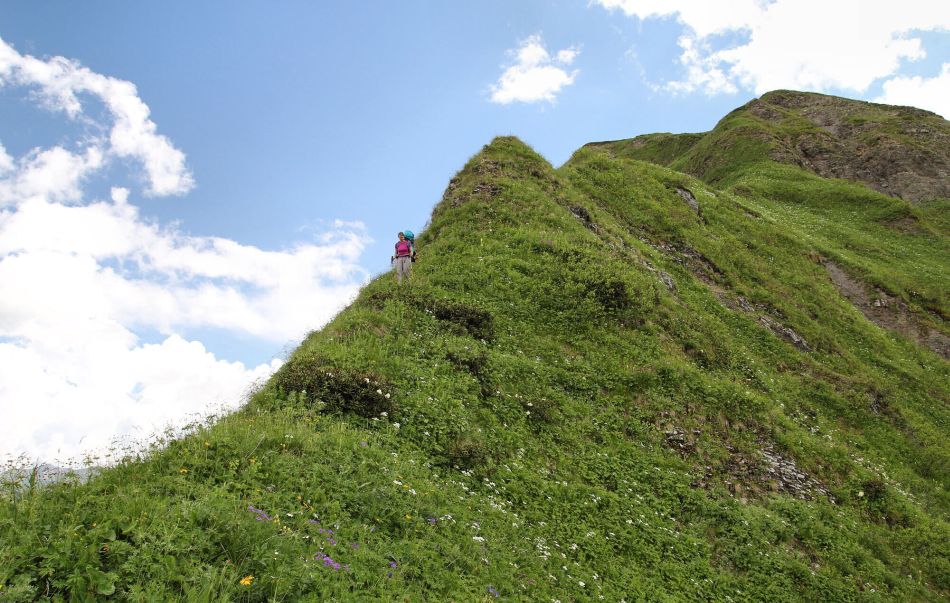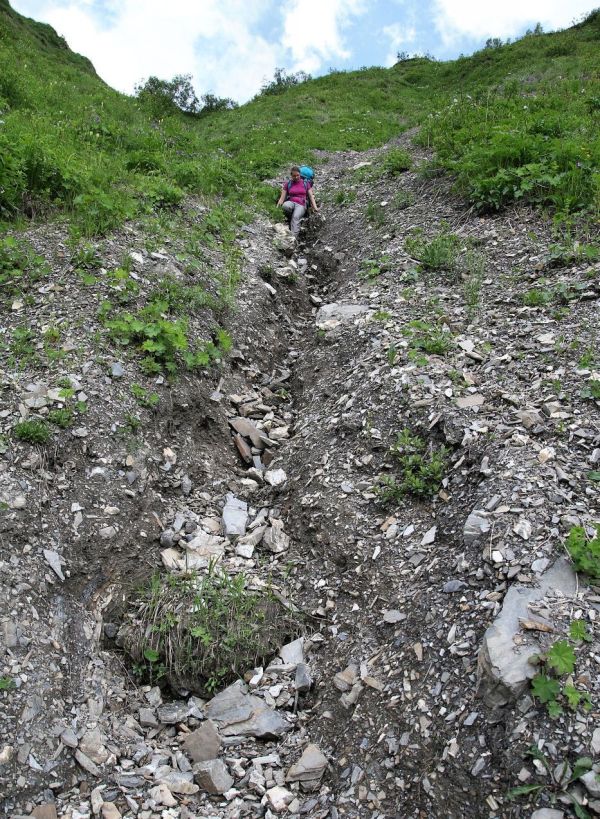
Torrent soon becomes too strong to cross and pushes us higher into the hillside, where we have to cross the landslide. That wouldn´t be that hard, if not for the heavy rain, which is soaking us again. We climb hundred meters through the scree, hoping to find the trail marked on our map. No success, there was never any road, a slope is completely overgrown with young birches. We have to go down again. Dense vegetation, silts, alders, more silts. Over and over again, we don´t even care about landslides anymore and simply traverse them.
Road! In the forest, we see fifty meters long lane without trees, with two ruts. That was a road! But it doesn´t lead anywhere. Just to meadows, where the hogweed grows four meters high and comfrey and nettles up to three meters. Finally, we find a meadow with weeds smaller than us. And a marked trail crosses it! Where does it go? Nowhere! Earlier, it probably led to the pass where we came from.
Nowadays, the only paths in vegetation are made by deer (those are barely visible and therefore useless) and by bears (those are well-trodden, but twist randomly and don´t lead anywhere). We are wondering, how to get our of here. If we followed the river, we would have to cover 15km to get onto the decent road - two days of grind with an uncertain outcome. It would take two or three days to return to Ghebi village in the east. Despair. We sit in a deep hole overgrown with hogweeds.
We pick the only remaining option - we follow the original plan to get to the Zeskho village to the northwest. At least the weather is merciful and we can continue next morning. First, we cross the strongest river so far - water is above knees and also pretty fast. Then we have to cross meadows, abandoned and overgrown. According to the map, we should climb through the forest onto the ridge to the left. That goes well and we even find something like remains of the road - but it´s blocked by branches in the forest and completely covered by vegetation outside of it.
We climb as much as possible, want to be finally on the pass. We make it to dense beech forest with blooming azaleas and once we cross it, we have no other option but to follow a narrow ridge. Finally on the alpine meadows, where we don´t have to fight our way through the vegetation. But there is a problem. Our ridge with old road doesn´t lead us to the pass, but to the nameless rocky summit. Between us and lowest section of the ridge are several hundred meters of emptiness. How could have Soviet cartographers made such a mistake?
We have to traverse the ridge. That requires mastery of levitation and some experience with scrambling on steep slopes covered by high grass. But we make it and enjoy our well-deserved lunch on narrow Lapuri pass at the elevation of 2600m, offering monstrous views. We have no idea how to get down, but we don´t have to climb anymore and that´s all that matters.

Traversing of the ridge
We can't descend directly. Slopes are up to 60° steep and occasionally turn into rock. We have to descend a bit more on the ridge, sometimes less than a meter wide. From the lowest saddle, we then slide on our butts through the small rubble into the trough of an occasional stream. From there it goes much better and not much later we can slide down on snowfields like on skis.
Suddenly, we see a trail separating from our trough. Trail! Beautiful cowpath! Indescribable experience. We go so easily, that even regular batch of rain and thunders can´t ruin our joy. Soon, we are at the shepherd´s huts and notice a tourist mark - fifth one so far. So this was really a hiking trail. And actually - why not. When we look over our shoulders, the ridge behind us really looks small and easy. Dwarf amongst the nearby giants. We follow the dirt road by the river and camp not much further.
In the morning, we attract the attention of passing border guards. They ask what we are doing here, where we came from and if we have a permit. We say that we don´t have one, haven´t met any guards before and locals told us it is not needed. We are asked to get one at the station which lies 1km upstream. Then they change their minds, a permit is not needed. Guards at least check our passports, everything is OK.
Half an hour later, they catch us again - they want to transcribe our names. It takes them a while, but finally they are done, we refuse the ride on the hull of police pick-up and hike to Zeskho. We would like to buy some food at the store. Vain hope. There are only four adults living in the village, almost self-sufficient. They grow potatoes and vegetables in the garden and about 8 cows per family is more than enough to provide cheese and yogurt. They just buy some flour and can stay in mountains also during winter. At this time, nobody will get here as the road is blocked by snow about 6 months in a year.

Descent from Lapuri pass
People used to live here all year long, but now are gradually moving to cities because of children - they have to go to school. There is no marshrutka service, only about twice a week drives the head of local alpine camp to the city. But we are out of luck, we rode yesterday. We ask for bread and cheese at one of the houses. We get whole loaf (of bread and cheese), matsoni and friendly welcome. They refuse money again, but finally, we force the young family to accept 20 lari and carry on to the nearest village, Mele, lying about 30km to the east.
Soon we meet police pickup again. They offer us a ride for the third time, we accept this time and jump onto the hull. We though that they will transport us just to the village, but they drive all the way to Tsageri, center of historical province Lechkhumi, which has a good connection with the rest of Georgia. Most of the time we drive on a gravel road, so from a hull, we enjoy almost three hours of a slightly dusty, but still wonderful sightseeing tour.
We also have a lunch break - policemen offer us cheese, eggs, biscuits, bread, vegetables.. a real feast. Even though we illegally entered a border zone, we are well taken care of. That´s the way it works here - rough land, hospitable people. They say, that each guest is a gift from God and it´s necessary to treat him well.
We spend rest of the hot day in the abandoned amphitheater at the edge of the city. In the morning, our journey continues - to Adraja Autonomous republic. We head to Batumi and Mtirala National park.



